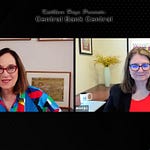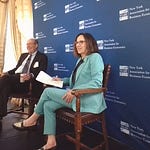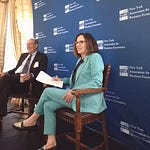Mickey Levy and Michael Bordo have been speaking and writing against President Trump’s drive to put tariffs on all kinds of imported goods from around the world since the day he announced them. They see them as negative for U.S. growth and at the very least one-time boosters of the price level and a potentially longer-time force keeping inflation above the Fed’s 2% target.
And that’s where they are focused now in their latest op-ed for the Wall Street Journal, “A Trade War Puts Pressure on the Federal Reserve: Lowering Interest Rates to Soften the Negative Risks Embedding Higher Inflation into the Economy.”
So dive in and hear what they have to say. Mickey says the Fed is likely to be inclined to cut rates quickly in keeping with its current tendency to respond more quickly to the labor market side of its mandate if it shows signs of weakening. But he and Michael both say the inflation side of the mandate is already at risk as key measures of inflation expectations already show signs of rising. And Michael says it will be a mistake for Fed officials to let the Trump team assume they will automatically cut rate to ward off a tariff-induced recession should it arrive.
These are two esteemed Fed-watching economists. Agree with them or not they are well worth your time.
Tariffs on a collision course with the Fed’s dual mandate 00:01:38.100
The key theme of our Op-Ed is that the tariffs are basically on a collision course with the Federal Reserve's dual mandate. So right now you have inflation.-Mickey
What’s colliding 00:01:53.780
Right now you have inflation at 2 and a half to 3%, depending on what measure you use. Wel above the Fed's 2% target inflationary expectations have risen a little bit recently and employment. The unemployment rate is low. But now you have the expected impact of the tariffs that will hit employment and the economy and may put upward pressure on inflation and inflationary expectations. So it's on a collision course. And so we address the issue. What should the fed do? -Mickey
Tariffs are like an oil shock 00:04:45.870
<This is like an oil shock and last time the fed did this…> it really really hit the economy hard and… raised unemployment…what they did was they accommodated the shock. In other words, they tried to offset it by expansionary monetary policy… this was taking place in a period where we already had high inflation… we had the Great Inflation. Inflation was above 6% at that time. And so by accommodating it. you kind of offset some of the negative effects. But you push inflation up. And this was a very big mistake because what it did in the U.S. was not only did it raise inflation, but it increased people's expectations of inflation which in itself can raise inflation. - Michael
Contrast this to Europe: they did not accommodate inflation 00:05:52.530
Okay, now contrast to what happened in Europe, in Germany and Switzerland, 2 countries that had been following very rule, like policies. And we're most concerned about price stability. They understood this, and they did not expand monetary policy. Guess what? The US had much, much worse inflation and stagflation. And the Europeans were better off. Okay, so this is a situation which is a lot like that, because it's a policy shop.- Michael
Does the Fed have the wrong reaction function for this? 00:08:36.320
…Through the history of the Federal reserve. The Fed tends to respond more quickly to weakness in employment than it does to high inflation. But as Mike just emphasized if the Fed is, prioritizes employment, and employment really weakens in here, and it lowers rates that would accommodate the negative <output> shock imposed by the tariffs and maybe mitigate the costs of them <on economic activity>. But it could raise inflation and embed inflationary expectations in economic behavior which exacerbates the problem and increases the cost.
Tariffs also distort 00:09:33.180
By their very nature, they <tariffs> distort economic behavior, they distort, they change relative prices. They distort global supply chains. And U.S. Business production processes. Fed easing does not offset those distortions. Mickey
The Fed should Stick to tis knitting 00:11:51.070
We're in a tricky situation. We have persistent inflation. And then we have these tariffs, which are a supply shock. So the question is, if other things <are> equal, and the tariffs themselves do not produce a huge depression, as they did in the 1930s, the Fed should stick to its knitting and not and not accommodate. -Michael
Being a shock absorber could be a bad choice for the Fed 00:13:55.710
<what if the Fed accommodates the shocks?> And not only will that not do anything with respect to the tariffs, because the Fed can't deal with tariffs. but, secondly, it could embolden the President and his crew to even put on more tariffs, knowing that the Fed is going to bail them out. Real world this is a moral hazard story, and this gets back to again themes that the shadows always push. Okay, you get unintended consequences because you give in to outside pressures. And this is the threat. This is a threat to the Fed's independence. Michael
The Fed’s March meeting- 00:16:25.730
I think one of the Key walkaways from tomorrow's Fed announcement, and particularly Jay Powell's Press Conference, is the Fed is going to emphasize the degree, the high degree of uncertainty, and that it's data dependent. And then that brings to issue what will it do now with bond yields, having come down that makes the White House happier. But now the Fed is really, really, on the hot seat when these tariffs start to unfold, and in the next couple months we're very likely to see the data start to show weakness in employment, higher, maybe higher inflation. And then we'll see what the fed does. Mickey
Dr. Mickey D. Levy
Mickey Levy is a macroeconomist who uniquely analyzes economic and financial market performance and how they are affected by monetary and fiscal policies. Dr. Levy started his career conducting research at the Congressional Budget Office and American Enterprise Institute, and for many years was Chief Economist at Bank of America, followed by Berenberg Capital Markets. He is a long-standing member of the Shadow Open Market Committee and is also a Visiting Scholar at the Hoover Institution at Stanford University.
Dr. Levy is a leading expert on the Federal Reserve’s monetary policy, with a deep understanding of fiscal policy and how they interact. He has researched and spoken extensively on financial market behavior, and has a strong track record in forecasting. Dr. Levy’s early research was on the Fed’s debt monetization and different aspects of the government’s public finances. He has written hundreds of articles and papers for leading economic journals on U.S. and global economic conditions, and has been an active voice on how financial markets are influenced by monetary policy. He has testified frequently before the U.S. Congress on monetary and fiscal policies, banking and credit conditions, regulations, and global trade, and is a frequent contributor to the Wall Street Journal, Bloomberg, and other media.
He is a member of the Council on Foreign Relations and the Economic Club of New York, and has previously served on the Panel of Economic Advisors to the Federal Reserve of New York, as well as the Advisory Panel of the Office of Financial Research.
Dr. Levy holds a Ph.D. in Economics from University of Maryland, a Master’s in Public Policy from U.C. Berkeley, and a B.A. in Economics from U.C. Santa Barbara.
Michael D. Bordo
Hoover Institution
Ilene and Morton Harris Distinguished Visiting Fellow
Michael D. Bordo is the Ilene and Morton Harris Distinguished Visiting Fellow at the Hoover Institution. Bordo is a Board of Governors Professor of Economics and director of the Center for Monetary and Financial History at Rutgers University, New Brunswick, New Jersey. He has held academic positions at the University of South Carolina and Carleton University in Ottawa, Canada. Bordo has been a visiting professor at the University of California at Los Angeles, Carnegie Mellon University, Princeton University, Harvard University, and Cambridge University, where he was the Pitt Professor of American History and Institutions. He is currently a distinguished visiting fellow at the Hoover Institution, Stanford University. He has been a visiting scholar at the International Monetary Fund; the Federal Reserve Banks of St. Louis, Cleveland, and Dallas; the Federal Reserve Board of Governors; the Bank of Canada; the Bank of England; and the Bank for International Settlement. He is a research associate of the National Bureau of Economic Research, Cambridge, Massachusetts, and a member of the Shadow Open Market Committee. He is also a member of the Federal Reserve Centennial Advisory Committee. He has a BA degree from McGill University, an MSc in economics from the London School of Economics, and PhD from the University of Chicago in 1972.
He has published many articles in leading journals including the Journal of Political Economy, the American Economic Review, the Journal of Monetary Economics, and the Journal of Economic History. He has authored and coedited fourteen books on monetary economics and monetary history. These include (with Owen Humpage and Anna J Schwartz), Strained Relations: US Foreign Exchange Operations and Monetary Policy in the Twentieth Century (University of Chicago Press, 2014); (with Athanasios Orphanides), The Great Inflation (University of Chicago Press for the NBER, 2013); (with Will Roberds), A Return to Jekyll Island (Cambridge University Press, 2013); (with Ronald MacDonald) Credibility and the International Monetary Regime (Cambridge University Press, 2012); (with Alan Taylor and Jeffrey Williamson), Globalization in Historical Perspective (University of Chicago Press for the NBER,2003). He is also editor of a series of books for Cambridge University Press: Studies in Macroeconomic History.
He is currently doing research on a Hoover Institution book project The Historical Performance of the Federal Reserve: The Importance of Rules, a project on “Bank Lending and Policy Uncertainty”; a project on “Financial Globalization and Financial Crises”; and a project on “Central Bank Credibility and Reputation: A Historical Perspective.”













Share this post